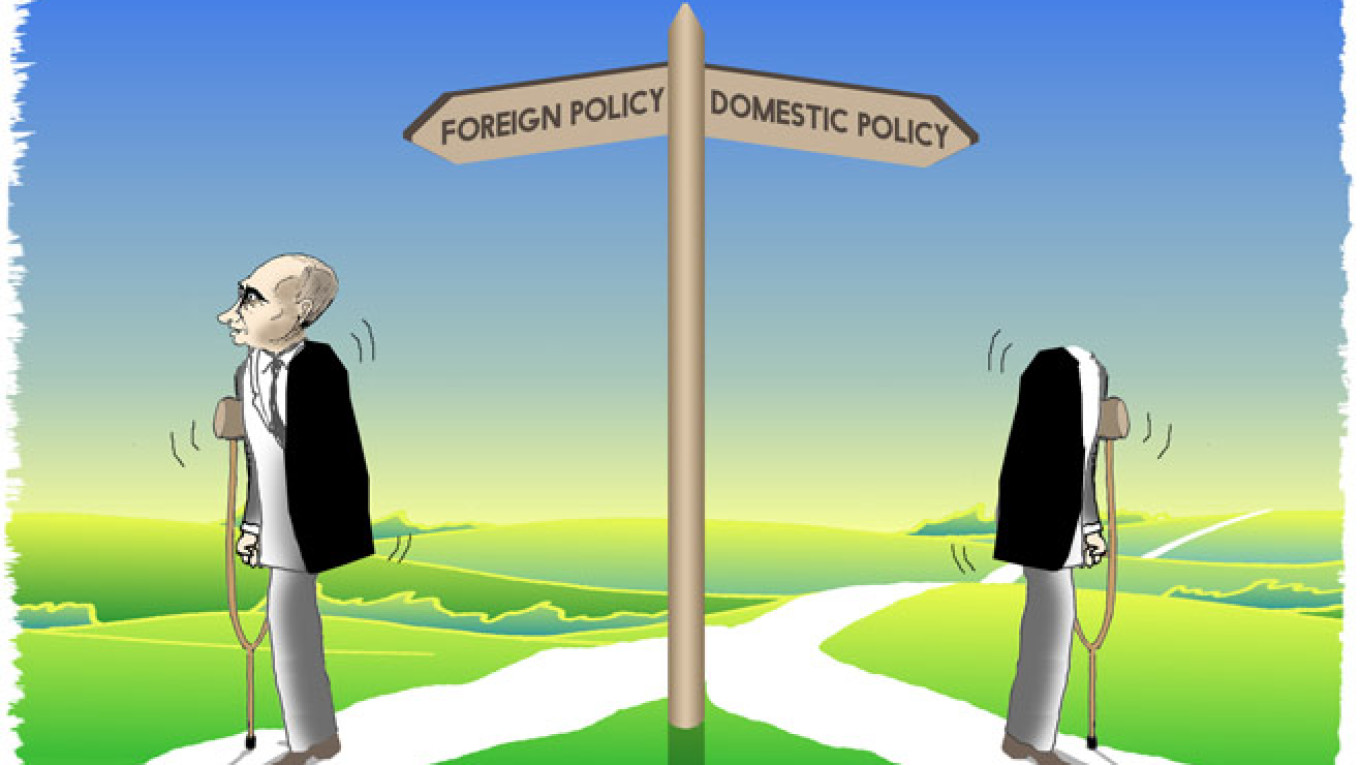Like a cow on ice, this country is struggling to find its footing as it essentially treads two completely divergent paths simultaneously: the domestic political course initially set down by former President Boris Yeltsin, and the foreign policy course established later by President Vladimir Putin.
Russians, who ever since February 1917 have been accustomed to the idea of a "bourgeois-democratic" revolution, still find it difficult to accept that Yeltsin ushered in a bourgeois revolution that was anything but democratic. There were several reasons for that, but the main one was that Yeltsin liked the bourgeois component because it ensured his hold on power and made possible the redistribution of Soviet property.
However, he realized that the democratic side of that equation would only interfere with his plans. As a result, the Yeltsin-era revolutionaries deliberately amputated the "democratic" leg and replaced it with a prosthesis, a sham democracy. Russia continues limping on that fake leg to this day. And Putin did not just appear out of nowhere: he emerged from the very milieu that Yeltsin had created.
Twice in the past 100 years, Russia slammed on the gas and sped toward a better future in such haste that it completely missed the "right turnoff." In 1917, Russia zipped right by the social democracy that brought success to many European countries. And under Yeltsin, it hurried right past the moderate liberalism that many people in the world have found entirely satisfactory.
Either system would have been acceptable for Russians as well. Had the Bolsheviks and Leninists — Russia's homegrown and maximalist young reformers — not twice veered off course, Russians would be leading very different lives today. But for some reason, Russians just cannot learn the lesson that you can't force history, and that if you try, it will only punish you for the effort.
Putin is the reaction to that. Such a "bounce back" ends every revolution. It is even necessary. It casts off all the excesses resulting from the blind heat of revolution while enshrining the positive gains in laws and institutions. What's more, the reactionary period makes it possible for the authorities to begin bombarding citizens with new ideas and slogans.
It is like repairing the furniture and putting the house back in order after a temperamental sailor has gone on a rampage. The goal is to make life more comfortable — and the country more manageable.
The problem is that a reactionary regime never tries to get the country out of the rut it is in. That is why Russia is left with a market, but without democracy — a situation that apparently suits Putin. What's more, it looks like Russia will remain in this rut for a very long time: it was in this rut all through tsarist times, and for many decades under communism.
And contrary to what the opposition imagines, it will take more than a couple of mass protests to shake it free. It will take a favorable confluence of events and the right leaders for Russia to extricate itself from this rut. If the system breaks from the outside, someone like Lenin would be in order. If it breaks from the inside, someone like former Soviet leader Mikhail Gorbachev would do the trick.
For his part, Putin managed to run Russia into a foreign policy rut on his own. This is first because Yeltsin was more interested in what was happening in his own "courtyard" than on the international arena, and second, because Russia was so weak at that time that it was absurd to even think about establishing an independent foreign policy course.
In addition, nobody in 1990s Russia really wanted to have an independent foreign policy. As Gorbachev quipped, Russia's Foreign Ministry under former Foreign Minister Andrei Kozyrev was essentially a branch of the U.S. State Department.
In his 15 years in power, Putin did what he could to strengthen the country, the military-industrial complex and the army, and to restore the country's sovereignty. He also returned Crimea to Russia, a move that most Russians enthusiastically support because they see it as restoring "historical justice."
But most importantly, the Kremlin has correctly focused on creating a multipolar world, one that is not led by a single sovereign surrounded by vassals devoid of their own will.
That course is fully justified because, from a historical perspective, Washington's attempt to assert its exclusive leadership after the collapse of the Soviet Union holds no promise. Of course, Russia is not the main player in this shifting balance of powers. China is on the rise and years from now, Germany will have its say. Time itself is working against the White House and many Western political scientists already understand that.
As for the sanctions, they do not scare Russia. If they make the West feel better, fine. Russia's real problem lies elsewhere, in the fact that its domestic and foreign policy courses diverge, making it impossible to know just where to stand. The question is whether, under such conditions, Russia is capable of accomplishing its strategic foreign policy objective?
History has shown that people can forge formidable weapons even under extremely adverse conditions. It was even possible for Chile to achieve certain economic gains under the rule of dictator Augusto Pinochet. However, without democracy, it is only possible to build a ramshackle system, not a healthy and robust economy and government. No matter how Moscow leaders might try, under current conditions they will always end up with a kleptocracy.
Soviet dissident Alexander Solzhenitsyn was right when he said, "A rotten and hollow tree is worthless."
Pyotr Romanov is a journalist and historian.


